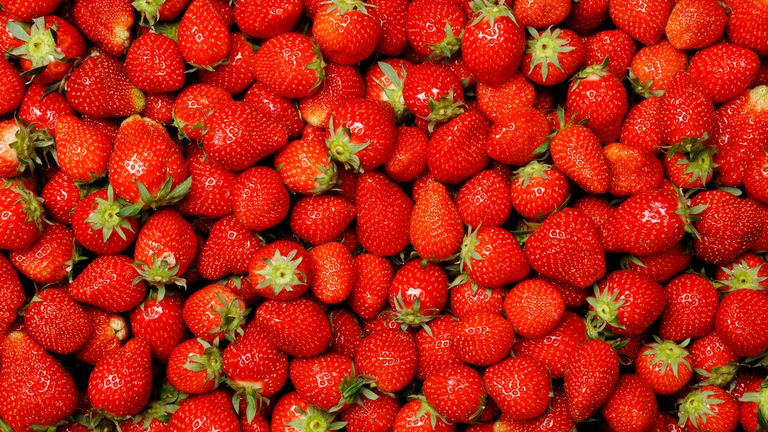The government should ban 25 pesticides which contain so-called “forever chemicals”, campaigners have said, as the potentially harmful toxins were found in more than half of the tested food and drinks available to Britons.
PFA chemicals, toxins which take centuries to break down in the environment, were found in more than 3,300 samples tested by the UK government in 2022.
As PFAs can accumulate in living organisms and have been linked to serious health conditions, campaign group Pan UK has called for the 25 PFA pesticides being used in the UK to be banned, including six classified as “highly hazardous”.
Out of all the items tested, strawberries were found to be the worst affected as 95% of the 120 tested samples contained PFAs.
The foods and drinks were tested for residues of around 401 pesticides, according to a report from the Environment Department’s advisory committee on pesticide residues (PRiF).
Peaches, cucumbers, apricots and beans all saw at least 15% of samples containing PFAs, the analysis showed.
The PRiF report said that 56.4% of samples tested contained a residue of pesticides they were testing, but this was below the maximum residue level (MRL) allowed in food by law.
Meanwhile, 1.8% of the samples contained a pesticide residue above this legal level.
The report said the UK’s Health and Safety Executive (HSE) conducts a risk assessment of all pesticide residues found in the testing programme and takes further action if risks to health are identified.
“It is useful to note, even when a food contains a residue above the MRL, HSE rarely finds any likely risk to the health of the people who have eaten the food,” it said.
However, Pesticide Action Network UK (Pan UK), said MRLs do not guarantee the quantity of pesticide found in the food is safe.
The organisation also claimed there wasn’t any consideration for the many other ways in which consumers can be exposed, such as plastic food packaging, drinking water and a wide range of household products.
Pan UK, which analysed the test results, found 61% of 109 grape samples contained PFAs, 56% of the 121 cherry samples, 42% of the 96 spinach samples and 38% of the 96 tomato samples.
Nick Mole, from Pan UK, said PFA pesticides are “absolutely unnecessary for growing food” as he urged the government to ban the 25 currently in use.
He said: “Given the growing body of evidence linking PFAs to serious diseases such as cancer, it is deeply worrying that UK consumers are being left with no choice but to ingest these chemicals, some of which may remain in their bodies long into the future.
“We urgently need to develop a better understanding of the health risks associated with ingesting these ‘forever chemicals’ and do everything we can to exclude them from the food chain.”
The organisation said ministers should also increase support for farmers to help them end their reliance on chemicals and adopt safer, more sustainable alternatives.
Dr Shubhi Sharma, from Chem Trust, which campaigns to protect humans and animals from harmful chemicals, called for a total ban on PFAs as she said they “have now contaminated every single corner” of the planet.
A Department for Environment, Food & Rural Affairs (Defra) spokesperson said in a response to Sky News: “We set strict limits on the pesticide residue levels in both food for consumers and feed for animals.
“These limits are set to protect public health and are set below the level considered to be safe for people to eat as well as applying to both food produced in the UK and those imported from other countries.”

